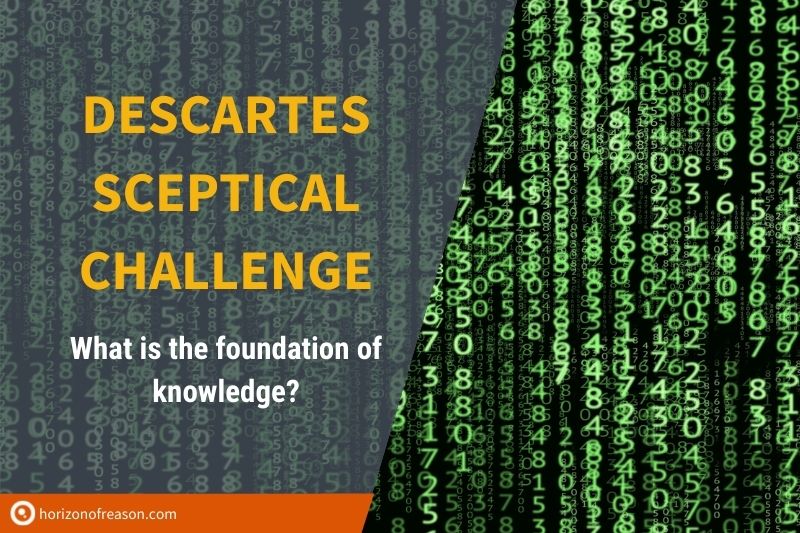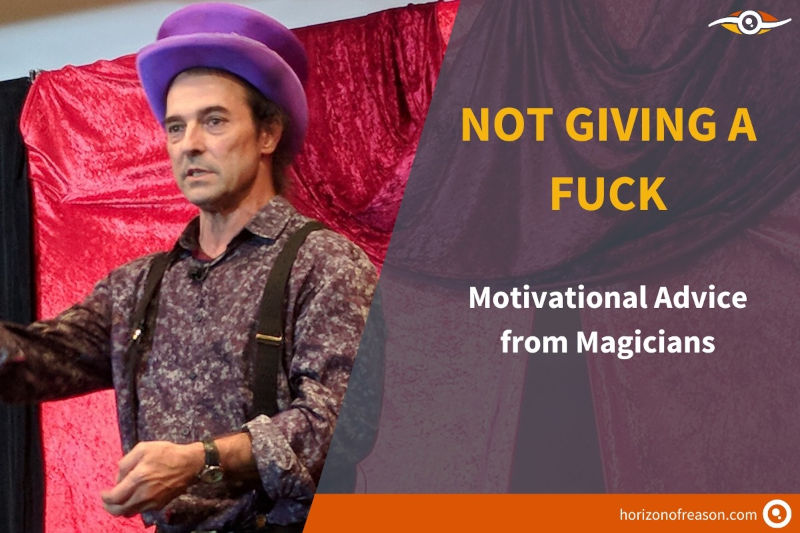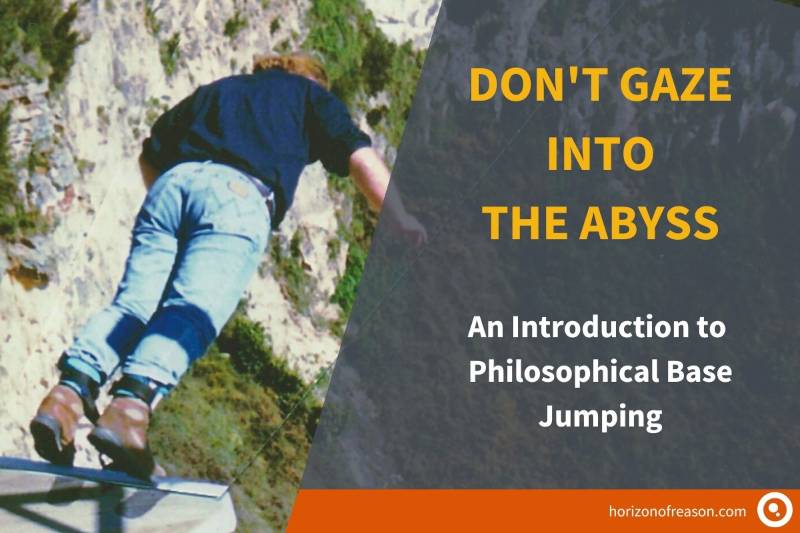
Descartes Sceptical Challenge and the foundation of knowledge?

Peter Prevos |
3516 words | 17 minutes
Share this content
The opening premise of the Meditations by René Descartes is a sceptical challenge, one that had been made urgent in Descartes' time by the conflict between science and religion. Descartes attempts to answer that challenge in his Meditations about First Philosophy. In this paper I will outline the sceptical challenge that Descartes imposes on himself and discuss whether or not Descartes is successful in answering it. The latter part of this paper deals with the question whether Descartes is a ‘methodist' in the Chisholmian sense of the word and whether there is another way of meeting the sceptical challenge posed by Descartes.
Descartes' Philosophical Project
Descartes philosophical project is to find a foundation for obtaining certain knowledge, which was brought about by the emerging natural sciences. He argues that the best way to begin a search for indubitable knowledge is by subjecting all his beliefs to a radical sceptical attack, even if this doubt would be considered ridiculous in ordinary life. Descartes goes down the path of methodical doubt because he realised that it was necessary "to demolish everything completely and start again right from the foundations".1 In the Discourse on Method—written some years before the Meditations—Descartes gives a prelude of his later philosophical work:2
Not that, in so doing, I imitated the sceptics who doubt only for doubting sake, and affect to be always undecided; for, on the contrary, my whole plan had for its aim assurance and the rejection of shifting ground and sand in order to find rock and clay.
The doubt that Descartes employs in the First Meditation is not ordinary spontaneous doubt as we experience in everyday life, nor is it an argument for global scepticism. His methodical doubt is a thought experiment, which he uses to clear his mind of preconceived ideas and find foundations for his new philosophy.
Descartes attempts to doubt everything he ever thought to be true — not by doubting all of his opinions one by one, but by attacking the sources of knowledge e.g. the senses, the mind (our ability to reason) and our imagination. Descartes provides three reasons for doubt in the First Meditation:
- The possibility that we are deceived by our senses leads him to the conclusion that we can never trust anything we learn through the senses;
- The possibility that we are now dreaming leads him to conclude that we can never trust the content of our consciousness;
- The most hyperbolic doubt at the end of the First Meditation is the introduction of the Malicious Demon (genus malignum or deceptor), deceiving us about the existence of the world:
I will suppose therefore that not God, who is supremely good and the source of truth, but rather some malicious demon of the utmost power and cunning has employed all his energies to deceive me. I shall think that the sky, the air, the earth, colours, shapes, sounds and all external things are merely the delusions of dreams which he had devised to ensnare my judgement.
This hypothesis implies an all encompassing doubt for it denies trusting our senses, the content of our consciousness and our ability to reason. The Demon can cause all of these illusions without any connection to a world outside our minds. In order for Descartes to lay the sceptical hypotheses to rest and find a foundation for certain knowledge, Descartes needs to slay the Malicious Demon.
Is Descartes' doubt justified?
Pierre Gassendi (1592–1655) approved of Descartes' project "for freeing [his] mind from all preconceived opinions", but he objected that "this strategy makes it necessary for [Descartes] to convince [himself] by imagining a deceiving God or some evil demon who tricks us, whereas it would surely have been sufficient to cite the darkness of the human mind or the weakness of our nature". Descartes' reply to this objection is that he needed to justify the doubt from a methodical point of view "for a philosopher knows that it is often useful to assume falsehoods instead of truths in this way in order to shed light on the truth". Descartes regards his doubt as merely hypothetical as he concludes the Synopsis of the Meditations by noting that "no sane person has ever seriously doubted" many of the matters that he calls into question.
Nineteenth century pragmatist Charles Peirce argued against Descartes that his doubt is not sincere and that we can not commence with complete doubt, but rather that we should start with prejudices that we actually have and that we should only doubt when justified through studies. Descartes' epistemic principle is that beliefs are false until proven correct, Peirce juxtaposes this by arguing that beliefs should be considered correct until proven false.
Newman argues against Peirce that Descartes' doubt need not be sincere. The misconception lies according to Newman in supposing that Descartes' method requires sincere doubt as opposed to a merely hypothetical doubt. Hypothetical doubt is according to Newman sufficient to induce recognition that one's confidence is not unshakably firm as is required for the foundations of knowledge.
Descartes' doubt is justified from a methodological point of view, but as Gassendi points out, the methodical doubt leads to the problematic sceptical hypothesis of the Malicious Demon. Ignoring the doubt because it is not considered to be sincere does however not take the sceptical hypothesis away. Descartes introduced the doubt to "prepare [the] readers' minds for the study of things which are related to the intellect". Descartes has however opened Pandora's box in the First Meditation and the question remains whether Descartes is able to close the box and lay the sceptical hypothesis to rest.
Can Descartes slay the demon?
Descartes' main argument against the existence of the Malicious Demon is the assumption that God is a good and perfect entity. Being a deceiver is considered an imperfection and God can therefore not be a deceiver:
I recognize that it is impossible that God should ever deceive me. For in every case of trickery or deception some imperfection is to be found; and although the ability to deceive appears to be an indication of cleverness or power, the will to deceive is undoubtedly evidence of malice or weakness, and so cannot apply to God.
Descartes' idea of God as an infinitely good being is based on the Catholic interpretation of the nature and attributes of God. This assumption is certainly not beyond doubt as it is not necessarily true that God is a perfect being. Descartes gives prime importance to the existence of God and writes in the Fifth Meditation that "certainty and truth of all knowledge depends on cognition of the one true God". It could be argued, however, of the opinion that Descartes' comments can not be taken at face value and that the Cogito is central to Descartes' epistemology, not the proofs for the existence of God.
The purpose of the proofs is to remove the doubt raised in the Third Meditation that a deceiving God may have created us with inadequate cognitive capabilities. The Cartesian proofs are however unsatisfactory because of his theological presuppositions. The doubt that we might be deceived about the existence of the external world and our cognitive capabilities therefore remains.
The problem of the criterion
American philosopher Roderick Chisholm (1916–1999) begins his discussion of the problem of the criterion by asking the following questions:3
- What do we know? or What is the extent of our knowledge?
- How are we to decide what are the criteria of knowing?
If we know the answer to either of these questions, then we are able to find an answer the other. If we can specify the criteria of knowledge (Question 2), then we may have a way of deciding how far our knowledge extends. Chisholm refers to this approach as ‘Methodism'. If we on the other hand know how far our knowledge reaches (Question 1), and are able to say what the things are that we know, then we may be able to formulate criteria enabling us to differentiate the things that we do know from those that we do not. Chisholm refers to this approach as ‘Particularism'. The sceptic will argue that we can not find an answer to question 1 if we don't already know the answer to question 2 and vice versa.
Descartes' philosophy contains both strands of Particularism and Methodism in the Chisholmian sense of the word. Descartes can be called a Methodist because he starts his philosophy with a method to obtain absolute certain knowledge—which is illustrated by the titles of two of his early works: the Regulae (the Rules) and Discourse de la Methode (Discourse on Method). Descartes writes in the Regulae that those who haphazardly "direct their minds down untrodden paths" are sometimes "lucky enough in their wanderings to hit upon some truth", but "it is better … never to contemplate investigating the truth about any matter than to do so without a method". In the Discourse on Method Descartes defines four rules for obtaining certain knowledge:
- "Never to accept anything as true that I did not know to be evidently so"
- "To divide each of the difficulties that I was examining, into as many parts as possible and necessary"
- "To conduct my thoughts in an orderly way, beginning with he simplest objects […] in order to climb gradually"
- "everywhere to make such complete enumerations and such general reviews that I would be sure to have omitted nothing."
Descartes' philosophy is however not purely Methodist in nature. Ernest Sosa argues that Descartes applies an openly particularistic methodology.4 Descartes' first step in escaping the vacuum of doubt is the Cogito (I think therefore I am). Descartes derives from the Cogito that he is essentially a thinking thing (res cogitans) and in the Third Meditation he subsequently points out that from the fact that he is a thinking thing he can conclude that "whatever I perceive very clearly and distinctly is true".
The fact that Cartesian philosophy contains both strands of Particularism and Methodism is illustrative of the circularity in Cartesian philosophy. Descartes needs to find a method to distinguish valid beliefs from wrong beliefs but we can only determine a correct method if we have some examples of justified beliefs. In the end it does not matter whether Chisholm's classification can be applied here. The main question is whether Descartes is able to answer the sceptical challenge and escape the circularity.
Are we ‘Brains in a Vat'?
Hillary Putnam described a modernised version of Descartes' Evil Genius—previously proposed by Peter Unger—by describing a world in which we don't have a body, but our brains are kept in a vat by an Evil Scientist, who feeds electric impulses to our brain which make us believe that we exist in a material world.5 This idea has recently been visualised by the Wachowski brothers in the science fiction trilogy The Matrix, in this version mankind is unknowingly imprisoned in incubators and our brains are connected to a virtual reality computer program called The Matrix.
In this last section of this paper I will discuss these modernised sceptical hypotheses. Two questions need to be asked to determine the validity of the sceptical hypotheses: could there be such an Evil Scientist or Matrix and if the answer to that question is true, does the sceptical conclusion follow?
The Principle of Unlimited Inquiry
Michael Slote uses principles of scientific reasoning to evaluate the acceptability of competing theories such as the ‘brain-in-vat' hypothesis versus real-world realism. The principle Slote advances to demonstrate that the sceptical hypotheses are unjustified is the Principle of Unlimited Inquiry:6
- It is scientifically unreasonable for someone to accept what is for him or her at that time an inquiry limiting explanation of a certain phenomenon;
- There is reason for such a person to reject such an explanation in favour of an acceptable non inquiry-limiting explanation of the phenomenon.
The Principle of Unlimited Inquiry expresses the intuition that scientific hypotheses should not rule out further investigation of their subject. Slote argues for the Principle because "science is essentially … an intellectual enterprise that seeks … the completest possible explanation of why things … are the way they are." Slote employs this principle to reject the Cartesian demon hypothesis and its modernised versions by arguing that the sceptical hypotheses are enquiry limiting.
When one accepts that we are for example brains in vats, all intellectual inquiry ceases as all phenomena are mere illusions and further inquiry is pointless. Slote's rejection of the sceptical hypotheses implies that theories that do comply with the Principle of Unlimited Inquiry can not be final explanations and hence that all scientific theories are temporary constructs. Final explanations—which is the ultimate goal for most scientists—are by themselves inquiry limiting because a final explanation would cease all further inquiry.
The sceptic can however embrace the Principle of Unlimited Enquiry because through this principle, science is not the final explanation of a material world outside our consciousness, but an instrument for making predictions about the world. Whether the world described by science is a material world or a virtual world is not significant.
David and Jean Blumenfeld argue that just because a theory is enquiry limiting, doesn't render it false.7 The principle of unlimited enquiry can be used as a guide for scientific research but not as a general principle for obtaining knowledge. The Blumenfelds distinguish for this reason between pragmatically reasonable and epistemic reasonable hypotheses. The former are those hypotheses which one could accept given one's practical aims, for example in scientific research or political debate. Epistemic reasonable beliefs are those beliefs for whose truth we have good evidence. Slote anticipates this objection and argues that pragmatically reasonable and epistemic reasonable are one and the same.
There are two ways of interpreting Slote's argument. One could say that if an hypothesis is scientifically reasonable then it is also epistemic reasonable. This is a plausible principle as it does not exclude any other forms of obtaining knowledge other than science from providing epistemologically reasonable beliefs. A second interpretation is that Slote means that a hypothesis is epistemologically reasonable if and only if it is scientifically reasonable. Slote defends the last reading by analysing ‘epistemologically reasonable' in terms of the agent's cognitive goals. These goals are of intellectual (or theoretical) understanding and knowledge in general, and includes no other interests.
The Blumenfelds however, show that it is sometimes necessary to hold ‘non-intellectual' beliefs to further one's intellectual concerns. Science is not a purely intellectual pursuit. French sociologist Bruno Latour has for example placed science and technology in a social context. He argues that science does not distinguish itself from other human activities through the application of logic, but through what Latour calls ‘associologic'—the ability to transform the perceived world by creating associations between phenomena. Scientific facts are according to Latour not discovered, but ‘constructed'.8 Slote is unable to reject the sceptical hypotheses by subjecting it to scientific standards because he overloads science by asserting that it is the only source of epistemic reasonable hypotheses.
Another objector to Slote's use of the Principle of Unlimited Inquiry to reject sceptical hypothesis is James Franklin. In his paper ‘Healthy Scepticism' he argues that there is a symmetry between the sceptical hypotheses and realism, e.g. both theories are equally valid in explaining our observations.9 The symmetry argument does not solve the question whether a Malicious Demon or Evil Scientist exists or not, but it shows that these sceptical hypotheses can not simply be argued away. Franklin discusses the argument raised by Slote that true beliefs lead to pragmatic success and that the realist hypothesis leads to predictions about actions, future events and so on. Franklin's reply is that ‘the correlation between true beliefs and pragmatic success can be doubted' and that ‘successful predictions do confirm realism, but … successful predictions also confirm illusionism'. Future predictions can be made in both the illusionary and realistic world view because scientific theories are inferred from perception, whatever the source may be.
Can we have certain knowledge?
The symmetry argument is very powerful in establishing that we have no way of knowing whether we are being deceived by the evil genius. Does this imply that we are for ever locked in a global scepticism, denying any veridicality to our sensory experience, the content of our consciousness and the validity of our inferences?
Franklin argues that in both the sceptical and the real-world hypotheses we can obtain knowledge about the world as we perceive it, the question remaining however is what this world is that we are referring to. I believe that this question is irrelevant in our every day lives and that even the staunchest sceptic has to accept that there is a world around us. Charles Landesman, who argues that colours do not exist, admits that when he is searching in the market for a ripe tomato, he has no doubt that the tomato he purchases is actually red.10
Thinking about the Malicious Demon, the Evil Scientist or The Matrix is analogue to speculating about what exists outside the universe. It is impossible for us to conceive of anything outside the universe (the theories of physics collapse when attempting to describe the universe prior to the Big Bang). Whatever exists outside the known universe has however no influence on our possibility to obtain knowledge about the world, whether the universe is material or consists of images in our mind is not important.
Comments by Aubrey Townsend
This is an impressive piece of work, demonstrating wide scholarship and considerable depth of understanding. My only real criticism is that I think you have tried to cover too much ground with a consequent loss of focus and depth in the discussion of some key issues. The comments that follow relate to sections of your essay.
Descartes' philosophical project
The discussion here misses some important issues. The first is the connection between the method of doubt and Descartes' scientific concerns. You touch on this at one point, but a bit more is needed to show why the sceptical arguments are so important for Descartes. Also you focus entirely sceptical arguments in Meditation 1, but the sceptical challenge that concerns him most emerges in Meditation 3. Though it could be briefly formulated in Meditation1, its full force only emerges after the Cogito and the introduction of the notion of clear and distinct perception.
Descartes challenged
This is a good discussion of the Meditation 1 program. But I think the doubts in Meditation 3 are not hypothetical, Descartes is confronted by an inconsistency between his views about the certainty found in the Cogito reasoning and his belief in the unlimited omnipotence of God.
This little section is rather weak. You did not allow yourself space to examine the arguments in any depth, but what you have done does not seem to take us far. What was really needed at this point was some discussion of the circularity objection, since that is where the most important philosophical issues are to be found.
The case for saying that Descartes is a Methodist is not well made. Certainly Descartes stresses the notion of method in both the early works and in the Meditations, but in the context of Chisholm's point 'method' has a more precise meaning, for to be a Methodist one must believe that there are certain criteria that we can look for and use to establish knowledge. In the Meditations Descartes comes nearest to this with the introduction of clear and distinct ideas, but he gets to this in the Particularist style. Some have suggested that the Method of Doubt is Methodist in Chisholm's sense: the idea being that we have knowledge when we find that we have beliefs that resist even the most extravagant attempts to doubt them.
A major worry I have here is that in leaving the discussion of Descartes at this point you leave too many things undiscussed, the most important being the role of clear and distinct perception and the circularity objection. I really think these topics are crucial to this essay.
Brains in a vat
The discussion of Slote is thorough and insightful. This is the best section of the essay.
Notes
René Descartes, Meditations on first philosophy, edited by John Cottingham (Cambridge: Cambridge University Press, 1996).
René Descartes, Discourse on method and the meditations (Harmondsworth: Penguin Books, 1968).
Roderick M. Chisholm, The foundations of knowing (Sussex: Harvester Press, 1982).
Ernest Sosa, ‘Chisholm's epistemic principles', Metaphilosophy 34:5 (October 2003).
Hilary Putnam, Reason truth and history (Cambridge: Cambridge University Press, 1981). Peter Unger, Ignorance, a case for scepticism (London: Clarendon Press, 1975), pp. 7–8.
Michael A. Slote, Reason and scepticism, edited by H.D. Lewis (London: Allen & Unwin, 1970).
David Blumenfeld and Jean Beer Blumenfeld, ‘Can I know that I am not dreaming?', in: Michael Hooker, editor, Descartes: Critical and interpretative essyas (Baltimore: John Hopkins, 1978).
Bruno Latour, Science in action. How to follow scientists and engineers through society (Milton Keynes, 1987).
James Franklin, ‘Healthy scepticism', Philosophy 66 (1991), pp. 305–323.
Charles Landesman, Skpeticism. The central issues (Oxford: Blackwell, 2002).
Share this content


